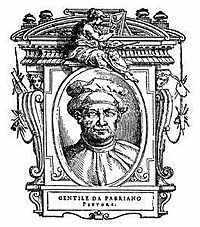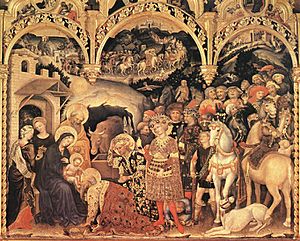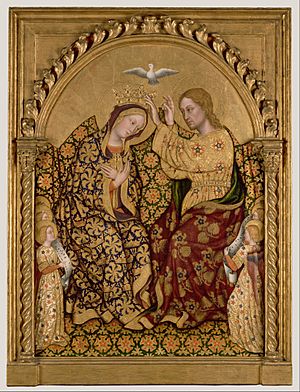Gentile da Fabriano facts for kids
Quick facts for kids
Gentile da Fabriano
|
|
|---|---|

Gentile da Fabriano, in a portrait by Giorgio Vasari
|
|
| Born |
Gentile di Nicolò di Giovanni
c. 1370 Fabriano, Papal States
|
| Died | 1427 (aged 56–57) Rome, Papal States
|
| Nationality | Italian |
| Known for | Painting |
|
Notable work
|
Adoration of the Magi |
| Movement | International Gothic |
Gentile da Fabriano (born around 1370 – died 1427) was a famous Italian painter. He was known for his beautiful art style called International Gothic. Gentile worked in many cities across central Italy, especially in a region called Tuscany. Some of his most famous paintings include Adoration of the Magi (from 1423) and Flight into Egypt.
Contents
Early Life and Art Journey
Gentile was born in or near a town called Fabriano in Italy. His mother passed away when he was young. His father, Niccolò di Giovanni Massi, became a monk when Gentile was about 10 years old. We don't know much about how he learned to paint. However, one of his first known artworks, a Madonna and Child (painted around 1395–1400), shows he was influenced by the late-Gothic painting style from northern Italy.
Working in Venice
Around 1405, Gentile da Fabriano started working in Venice, a famous city in Italy. He painted a large picture for a church there, but it is now lost. Another artist named Jacopo Bellini might have worked with him during this time. Between 1408 and 1409, Gentile painted a fresco (a painting done on wet plaster) in the Doge's Palace. This painting, which is also lost today, showed a naval battle. In Venice, he met other important artists like Pisanello. He also took on painting jobs for other cities, such as a Madonna and Child for a church in Perugia.
Paintings in Central Italy
Between 1410 and 1412, Gentile created one of his first major artworks, the Valle Romita Polyptych. A polyptych is a painting with many panels. This artwork can now be seen at the Pinacoteca di Brera museum. Around the same time, in 1410–1411, he was in Foligno, where he painted frescoes in the Palazzo Trinci.
In 1414, he moved to Brescia and worked for a powerful leader named Pandolfo III Malatesta. He painted the Broletto Chapel there, but most of that work is now lost. By the spring of 1420, he was back in his hometown of Fabriano.
Famous Works in Florence and Rome
On August 6, 1420, Gentile arrived in Florence, a very important city for art. Here, he painted his most famous altarpiece called Adoration of the Magi in 1423. This painting is now in the Uffizi Gallery and is considered a masterpiece of the International Gothic style. It shows incredible detail and rich colors.
Other works he created in Florence include the Quaratesi Polyptych and the Intercession Altarpiece. In the summer of 1425, he was in Siena, where he painted a Madonna with Child for a building in Piazza del Campo, but this painting is now lost. Later that year, he was in Orvieto, where he painted a fresco of the Madonna and Child in the Cathedral.
In 1427, Gentile arrived in Rome. He was hired by Pope Martin V to decorate the nave (the main part) of the Basilica of St. John in Lateran. Sadly, Gentile passed away before he could finish this work, and another artist named Pisanello completed it.
Death and Legacy
Gentile da Fabriano died before October 14, 1427. It is often said he was buried in a church in Florence, but his tomb disappeared. However, some evidence suggests he might be buried in the church of Santa Maria in Trastevere in Rome, which is where he died.
He left behind very few paintings in his home region of Marche, except possibly a Madonna and Child in the Duomo at Sant'Angelo in Vado. He also left one painting in Venice. Gentile's detailed and colorful style greatly influenced other artists of his time.
Images for kids
-
Pseudo-Arabic script in the Virgin Mary's halo, detail of Adoration of the Magi (1423) by Gentile da Fabriano; the script is further divided by rosettes like those on Mamluk dishes, executed in pastiglia
See also
 In Spanish: Gentile da Fabriano para niños
In Spanish: Gentile da Fabriano para niños
 | Calvin Brent |
 | Walter T. Bailey |
 | Martha Cassell Thompson |
 | Alberta Jeannette Cassell |




